Stay at home for the holidays, Greenland warns would-be travelers
Public health authorities are particularly concerned that returning travelers will touch off a wave of coronavirus infections.

The message on the Greenland government’s official greeting leaves no room for doubt: Anyone still thinking about leaving the country for the Christmas holiday ought to think again.
The Christmas greeting from the Naalakkersuisut to residents, posted on Tuesday, reads simply, in Greenlandic and Danish, “Have a merry Christmas – in Greenland” (see below).
The greeting was published as public health authorities were reiterating the same message, which is a recommendation that has become increasingly emphatic in recent weeks as COVID-19 infection rates in Denmark, and in particular Copenhagen — currently the only destination for international flights from Greenland — have set consecutive daily records.
In Greenland, meanwhile, no one is known to be infected with the virus that causes COVID-19 after the most recent case — its 19th overall — reportedly tested negative. The individual had tested positive on Dec. 8 after travelling to Greenland from Denmark.

Public health authorities fear that an influx of travelers before Christmas and a returning wave of people to Greenland after the holidays will carry COVID-19 with them, potentially overwhelming the country’s health system.
“The situation in Denmark is critical,” Anna Wangenheim, Greenland’s health minister, said during a press conference on Tuesday.
In order to limit the number of people travelling to and from Greenland, the Self-Rule Authority, earlier this month, ordered all flights between Denmark and Greenland to be cancelled in the days leading up to Christmas.
Although the Self-Rule Authority does not have plans to order further cancellations, public-health authorities say their focus right now is on preventing people from returning to Greenland from causing an outbreak.
“We have a setup in Greenland that allows us to manage sporadic cases of corona,” Henrik L. Hansen, the chief medical officer, said. “We didn’t have that in the spring, but the number of cases in Denmark is likely to only increase over the Christmas holiday, and that means that people travelling out and then back between Christmas and New Year’s can bring the virus back with them.”
[Seeking to prevent COVID-19 outbreak, Greenland grounds Christmas flights]
Of particular concern, according to Hansen, are healthcare workers from Denmark who return home for the holidays but are unable to travel back to Greenland after Christmas, either because they test positive for COVID-19 or because they are unable to be tested at one of Denmark’s overburdened test facilities.
In some parts of Denmark, waiting times for tests is currently close to five days. The Self-Rule Authority requires all travelers to Greenland to test negative for COVID-19 within five days of their departure.
“The result,” Hansen said, “could be that the foreign healthcare workers that we depend on in Greenland getting stuck in Denmark.”
[Read more coverage about COVID-19 and the Arctic]
To those who do plan to travel, Wangenheim underscored the importance of remaining in quarantine until testing negative for COVID-19. Concern about people breaking quarantine has again become a matter of concern after it emerged that police had fined a 20-year-old woman who had recently returned to Greenland after she broke her quarantine.
“The message to parents and families whose children are studying in Denmark is that you need to help your children remain in quarantine,” Wangenheim said.
Looking further ahead into 2021, Hansen reckons that Greenland will be able to begin vaccinating residents on a widespread basis in January. Greenland will receive its vaccines from Denmark, and Hansen expected a limited amount of the vaccine — perhaps 3,000 doses or so — to arrive at the end of this month, although there is currently no plan for who will be the first to be inoculated.
“We don’t know yet when everyone in Greenland will be offered the vaccine, but we can expect that we will receive enough doses in the first months of 2021 that we will be able to offer it to everyone in Greenland,” he said.